On Kickstarter, they raise funds for the Robokind Zeno R25 robot, which is able to recognize and mimic emotions
Currently, an American Kickstarter is raising funds for a project to create a robot Robokind Zeno R25, which is able to recognize and simulate emotions. The project ends on November 23. The goal of the campaign is an amount of $ 50,000 (ten days before the end of the project, $ 15,000 was raised). We do not agitate dear Habr to support the project (but we do not discourage it), we only want to talk more about this robot so that it is clear at what stage of development robotics is today and how accessible it is for the average person. After all, if the Kickstarter campaign ends successfully, the first Zeno R25 shipments (and it will cost only $ 2700) will begin in March 2014.
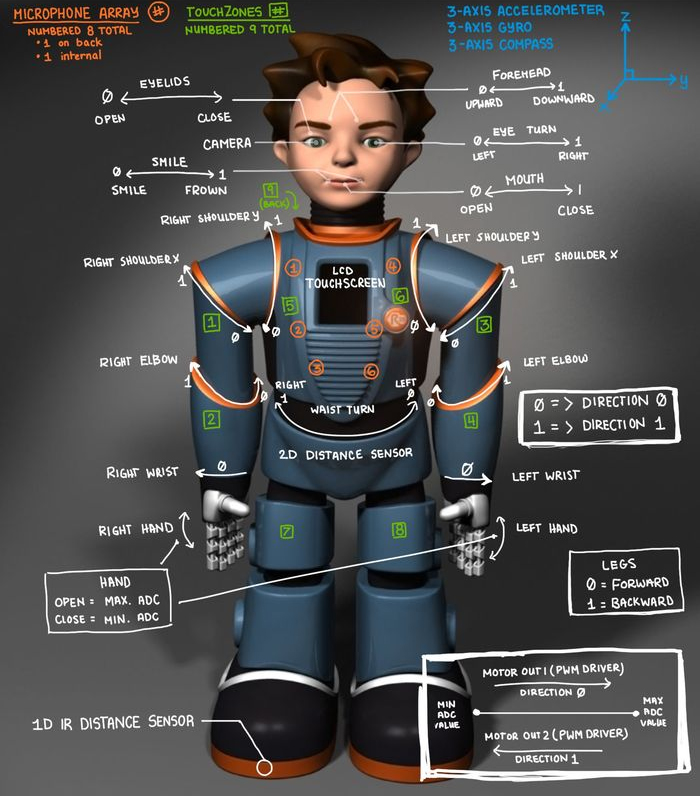
RoboKind, formerly known as Hanson Robotics, has been working on creating interactive robots for several years: they have the Einstein robot, the Diego-san robot child and the early version of Zeno. Based on previous developments, the idea came up to create a robot capable of realistically showing human emotions, and then combine it with high-level artificial intelligence.
RoboKind already has a fairly strong reputation, but the company still has not been able to enter the consumer market, because the price of each robot remains quite high. Their previous model, the Zeno R50, costs $ 16,000, and it is unlikely that a simple consumer can afford such a purchase. The Zeno R25 is being developed as an inexpensive version of the R50, and will cost $ 2,700.

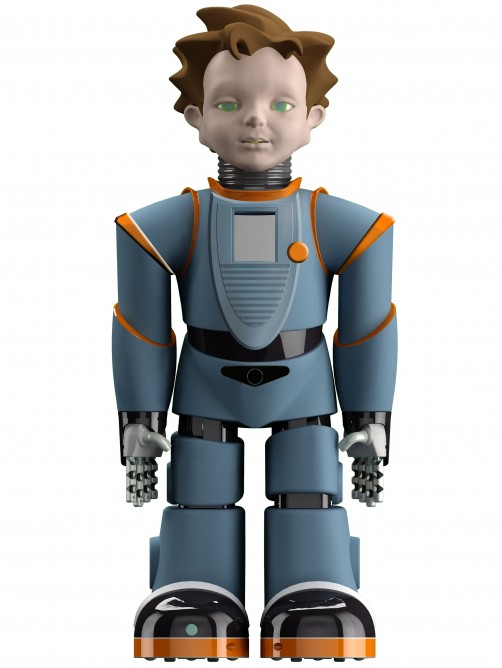
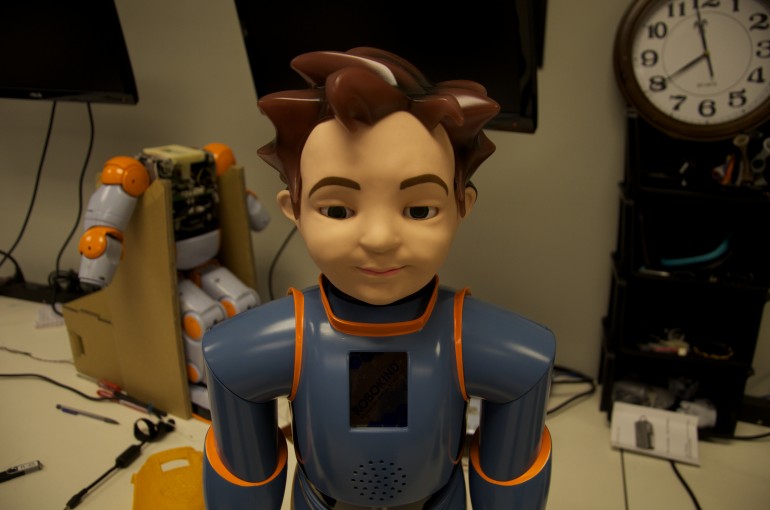
Although the external Zeno R25 looks like a big toy, inside it is a rather complex car. The robot is equipped with a dual-core ARM processor with a clock frequency of 1.5 GHz, 1 GB of RAM and 8 GB of internal memory, which can be expanded with a microSD card slot. Zeno R25 is powered by open source software that enthusiasts can modify as they wish. Zeno R25 supports Wi-Fi and Bluetooth wireless protocols.
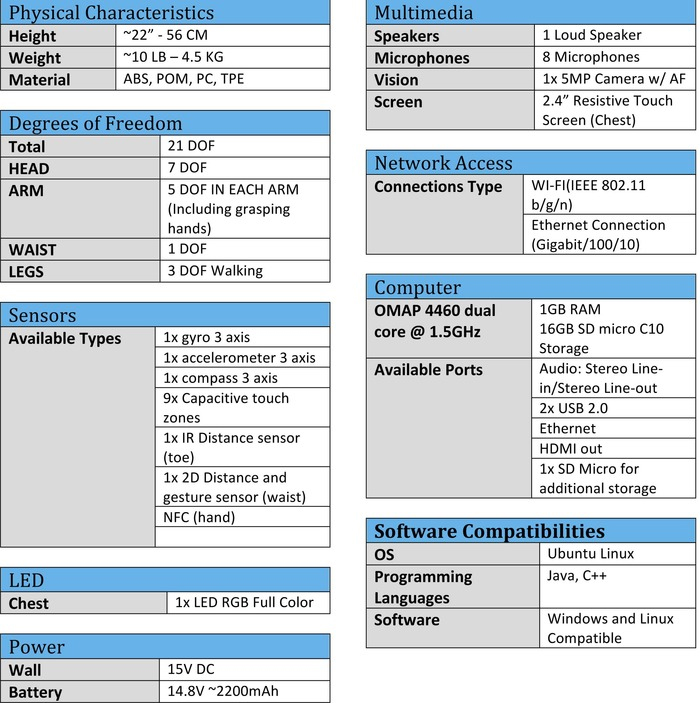
Since the robot is interactive, its right eye is equipped with a 5 megapixel camera with autofocus. Camera control algorithms allow the Zeno R25 to distinguish between colors, movement, faces, and read QR codes. In addition, the CompuCompassion system developed by Robokind endowed the robot with the ability to detect emotions and respond to them.
For the perception of audio information Zeno R25 is equipped with 8 microphones with noise reduction. To control and configure a resistive touch screen with a resolution of 240 x 320 pixels, mounted on the chest of the robot. Also, Zeno R25 is equipped with infrared sensors for determining distance, a compass, gyroscope, accelerometer and speaker, and there are nine touch sensitive areas on its body. The photo is presented at the very beginning.
Zeno 25 is driven by 21 engines that are mounted inside the body with 15 degrees of freedom. The robot can move forward, backward and rotate. Even his face has six degrees of freedom, which allows him to express a wide range of emotions in non-verbal communication.
RoboKind sees a number of advantages in a robot that can detect and show emotions. As an entertainment, Zeno R25 reads books, tells stories and jokes, can answer questions (and find information to answer on the Internet), and FunkTank software allows him to feel the rhythm and dance to the music.
RoboKind also states that Zeno R25 will be able to conduct classes for elementary grades, teach foreign languages, basic reading, history, geography or mathematics. It can be a teaching and research tool for a university course in robotics.
One of the promising areas of Zeno R25 can be autism therapy. The paradox of humanoid robots is that the more realistic they become, the less realistic they seem. Zeno R25 will seem strange to many people, but autistic children find it difficult to understand complex human emotions and social signals, so they will easily make contact with the robot. The robot can not only talk with the child, but also record therapy sessions on video. RoboKind has also developed learning modules that help autistic children learn how to recognize emotions and improve their social interaction.
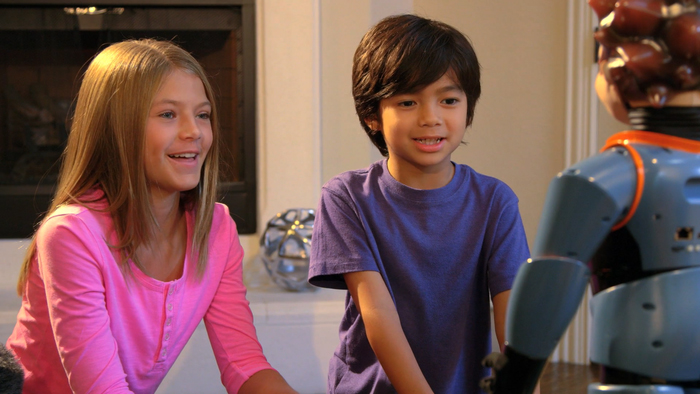
Kickstarter fundraising ends on November 23. The campaign’s goal is $ 50,000. If the campaign succeeds, the first Zeno R25 shipments will begin in March 2014.
As crowdfunding implies, RoboKind offers each sponsor small gratitude and rewards (depending on the amount of the donation):
For $ 1 - eternal gratitude from the project;
For $ 5 - exclusive robot stickers;
For $ 25 - a t-shirt with the image of a robot;
For $ 59 - getting a robot avatar;
For $ 99 - avatar of the robot and participation in the webinar;
For $ 199 - video recording of a personal message from a robot who is even ready to tell you a poem + stickers and a T-shirt;
Etc.
For help in the amount of $ 2699, by the way, you are entitled to one of the first five hundred robots Zeno R25. If you live outside the United States, shipping will cost another $ 200. And for $ 9999, the sponsor will have the opportunity to meet with the robot development team. True, all this will fit on a one-day tour.
Taking this opportunity, we remind you that our book for children with simple experiments is already approaching the press, the approximate date of transfer to production is November 18. We also raised funds for its publication through crowdfunding. The book’s pre-order is still open.

A bit of history
RoboKind, formerly known as Hanson Robotics, has been working on creating interactive robots for several years: they have the Einstein robot, the Diego-san robot child and the early version of Zeno. Based on previous developments, the idea came up to create a robot capable of realistically showing human emotions, and then combine it with high-level artificial intelligence.
RoboKind already has a fairly strong reputation, but the company still has not been able to enter the consumer market, because the price of each robot remains quite high. Their previous model, the Zeno R50, costs $ 16,000, and it is unlikely that a simple consumer can afford such a purchase. The Zeno R25 is being developed as an inexpensive version of the R50, and will cost $ 2,700.



Specifications
Although the external Zeno R25 looks like a big toy, inside it is a rather complex car. The robot is equipped with a dual-core ARM processor with a clock frequency of 1.5 GHz, 1 GB of RAM and 8 GB of internal memory, which can be expanded with a microSD card slot. Zeno R25 is powered by open source software that enthusiasts can modify as they wish. Zeno R25 supports Wi-Fi and Bluetooth wireless protocols.

Since the robot is interactive, its right eye is equipped with a 5 megapixel camera with autofocus. Camera control algorithms allow the Zeno R25 to distinguish between colors, movement, faces, and read QR codes. In addition, the CompuCompassion system developed by Robokind endowed the robot with the ability to detect emotions and respond to them.
For the perception of audio information Zeno R25 is equipped with 8 microphones with noise reduction. To control and configure a resistive touch screen with a resolution of 240 x 320 pixels, mounted on the chest of the robot. Also, Zeno R25 is equipped with infrared sensors for determining distance, a compass, gyroscope, accelerometer and speaker, and there are nine touch sensitive areas on its body. The photo is presented at the very beginning.
Zeno 25 is driven by 21 engines that are mounted inside the body with 15 degrees of freedom. The robot can move forward, backward and rotate. Even his face has six degrees of freedom, which allows him to express a wide range of emotions in non-verbal communication.
RoboKind sees a number of advantages in a robot that can detect and show emotions. As an entertainment, Zeno R25 reads books, tells stories and jokes, can answer questions (and find information to answer on the Internet), and FunkTank software allows him to feel the rhythm and dance to the music.
RoboKind also states that Zeno R25 will be able to conduct classes for elementary grades, teach foreign languages, basic reading, history, geography or mathematics. It can be a teaching and research tool for a university course in robotics.
One of the promising areas of Zeno R25 can be autism therapy. The paradox of humanoid robots is that the more realistic they become, the less realistic they seem. Zeno R25 will seem strange to many people, but autistic children find it difficult to understand complex human emotions and social signals, so they will easily make contact with the robot. The robot can not only talk with the child, but also record therapy sessions on video. RoboKind has also developed learning modules that help autistic children learn how to recognize emotions and improve their social interaction.

Fundraising campaign
Kickstarter fundraising ends on November 23. The campaign’s goal is $ 50,000. If the campaign succeeds, the first Zeno R25 shipments will begin in March 2014.
As crowdfunding implies, RoboKind offers each sponsor small gratitude and rewards (depending on the amount of the donation):
For $ 1 - eternal gratitude from the project;
For $ 5 - exclusive robot stickers;
For $ 25 - a t-shirt with the image of a robot;
For $ 59 - getting a robot avatar;
For $ 99 - avatar of the robot and participation in the webinar;
For $ 199 - video recording of a personal message from a robot who is even ready to tell you a poem + stickers and a T-shirt;
Etc.
For help in the amount of $ 2699, by the way, you are entitled to one of the first five hundred robots Zeno R25. If you live outside the United States, shipping will cost another $ 200. And for $ 9999, the sponsor will have the opportunity to meet with the robot development team. True, all this will fit on a one-day tour.
The book "Simple Science"
Taking this opportunity, we remind you that our book for children with simple experiments is already approaching the press, the approximate date of transfer to production is November 18. We also raised funds for its publication through crowdfunding. The book’s pre-order is still open.
